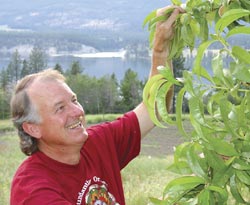Berryman Family Orchard
by Trudy Bialic, Sound Consumer Editor
This article was originally published in August 2004

(August 2004) — Nothing says summer like the perfect peach — velvety red skin and tender yellow flesh like sunshine. One bite and the juice runs down your chin and fingers. It tastes like hot, still summer days, of heavy ripeness in a dusty orchard where the bees swoon from the sweetness of the air.
There’s a recipe for growing the perfect peach. Orchardist Bob Berryman says it’s hitting the right combination of soil, sun and water. It also depends on whether the farmer is aiming for weight or flavor. This choice determines your growing strategy.
“Non-organic growers often pump up their fruit with lots of nitrogen fertilizer and water. They get more size and weight to their fruit but they don’t get the flavor,” says Berryman. “They won’t ever get the flavor because it’s watered down.”
That’s why dry-land peaches — those grown in drier conditions — are notoriously delicious. Without a lot of rainfall or irrigation, the sugar content and flavor become concentrated.
Berryman’s orchard is in a fairly dry part of the state — near Kettle Falls along the Columbia River — that gets only 16 inches of rainfall a year. Moderate snowmelt and summer showers help throughout the season.
Berryman’s peaches taste better for other reasons, too. “Many large growers pick their peaches green and hard because they go through a mechanical packing line — a sorting line — where they fall through holes for sizing,” he says.
“At Twin Springs Farm, we pick our peaches when they’re ‘tree ripe.’ It’s a firm ripe, but it’s got the sugar content up and has really good flavor. We pick by hand into a bucket that goes from the field to a cooler. We sort by hand. And within a day or two, they’re on their way to Petersen’s (a PCC distributor) and PCC stores. Consumers can have a really tree-ripened peach this way.”
Berryman began ranching cattle in Missouri and then experimented with lentils and peas in Washington’s Okanogan County in the 1970s. But too many farmers there were using synthetic chemicals so he moved near Kettle Falls where about half the local farmers are growing food organically. In 1981, he and his wife, Shelly, planted Twin Springs Farm with peaches, apples, pears, apricots, nectarines and Italian prunes.
As the summer burns down, the Berrymans will deliver seven different peach varieties to PCC consumers. The Early Redhavens come first, then the Redhavens, the Blazing Stars, Fairhavens, Red Globes, Hales and finally, by September, the popular Suncrest. It’s a great peach made famous by David Masumoto’s book Epitaph For A Peach. Berryman says the Suncrest is special with fabulous flavor, and they can reach a good size, too.
The first Berryman peaches started arriving at PCC stores the end of July. Enjoy each variety in turn: Eat them fresh, slice and freeze them just as they are, or make jam and pies. Twin Spring Farm’s peaches are all organic and local — with all the flavor of summer from a farmer we know and trust.
